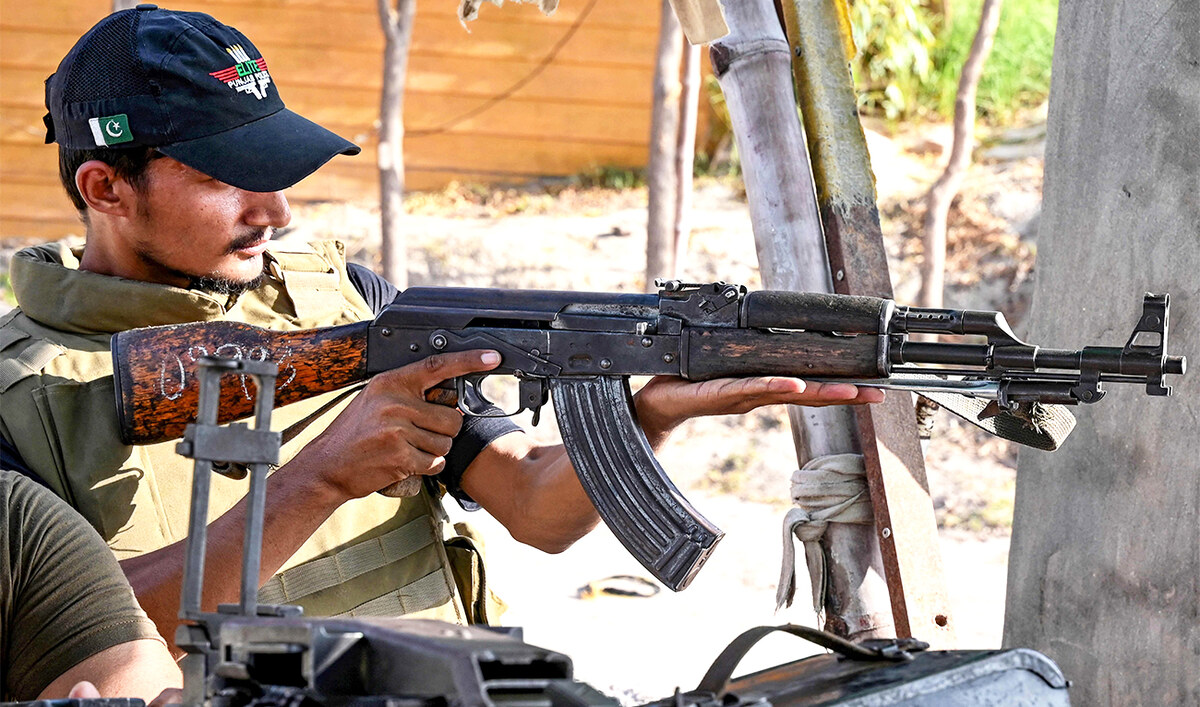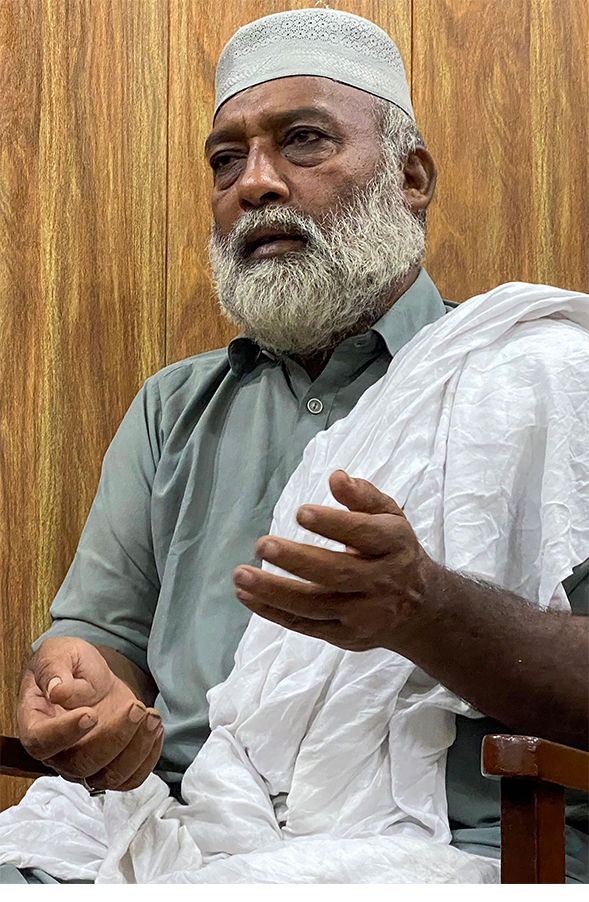RAHIM YAR KHAN: With a showmanÔÇÖs flair and an outlawÔÇÖs moustache, the Pakistani gangster dials the hotline on his own most wanted notice ÔÇö taunting the authorities who put a bounty on his head.
Staring down the lens in a social media clip, Shahid Lund Baloch challenges the official on the phone and his thousands of viewers: ÔÇťDo you know my circumstances or my reasons for taking up arms?ÔÇť
The 28-year-old is hiding out in riverine terrain in central Punjab which has long offered refuge to bandits ÔÇö using the Internet to enthral citizens even as he preys on them, police say.
On TikTok, Facebook, YouTube and Instagram he fascinates tens of thousands with messages delivered gun-in-hand, romanticizing his rural lifestyle and cultivating a reputation as a champion of the people.
But he is wanted for 28 cases including murder, abduction and attacks on police ÔÇö with a 10 million rupee ($36,000) price on his head.
ÔÇťPeople who are sitting on the outside think he is a hero, but the people here know he is no hero,ÔÇŁ said Javed Dhillon, a former lawmaker for Rahim Yar Khan district close to the hideouts of Baloch, and other bandits like him.
ÔÇťThey have been at the receiving end of his cruelty and violence.ÔÇŁ
Baloch is said to dwell on a sandy island in the ÔÇťKatcha landsÔÇŁ ÔÇö roughly translating as ÔÇťbackwatersÔÇŁ ÔÇö on the Indus River which skewers Pakistan from top to bottom.
High-standing crops provide cover for ambushes and the region is riven by shifting seasonal waterways that complicate pursuit over crimes ranging from kidnapping to highway robbery and smuggling.

An elite police personnel monitoring security near a post on a sandy island along the Indus river, in the 'Katcha lands' at Rahim Yar Khan district, Pakistan, on October 9, 2024 (AFP)
At the intersection of three of PakistanÔÇÖs four provinces, gangs with hundreds of members have for decades capitalized on poor coordination between police forces by flitting across jurisdictions.
ÔÇťThe natural features of these lands support the criminals,ÔÇŁ said senior police officer Naveed Wahla. ÔÇťTheyÔÇÖll hide out in a water turbine, move in boats, or through sugarcane crops.ÔÇŁ
Sweeping police operations and even an army incursion in 2016 failed to impose law and order. This August, a rocket attack on a police convoy killed 12 officers.
ÔÇťIn the current state of affairs here there is only fear and terror,ÔÇŁ said Haq Nawaz, whose adult son was abducted late September for a five million rupee ransom he cannot afford.
ÔÇťThere is no one to look after our wellbeing,ÔÇŁ he complains.

In this photograph taken on October 10, 2024, Haq Nawaz, whose adult son was abducted by bandits, speaks during an interview with AFP in Rahim Yar Khan district. (AFP)
But the gangs are increasingly online.
Some use the web to lay ÔÇťhoney-trapsÔÇŁ luring kidnap victims by impersonating romantic suitors, business partners and advertising cheap sales of tractors or cars.
Some parade hostages in clips for ransom or exhibit arsenals of heavy weapons in musical TikToks.
Baloch has by far the largest online profile ÔÇö irking police with a combined 200,000 followers.
Rizwan Gondal, the head police officer of Rahim Yar Khan district, says that his detectives have a dossier proving his ÔÇťheinous criminal activities.ÔÇŁ
ÔÇťPolice have made multiple efforts to capture him however he escapes,ÔÇŁ he added.
ÔÇťHeÔÇÖs a very media savvy guy. Let him say, ÔÇśI am going to surrender before the state to prove that I am innocentÔÇÖ and let the media cover it.ÔÇŁ
In his clips Baloch protests his innocence whilst casting himself as a vigilante in a lawless land, claiming he chose to fight only after family members were slain in tribal clashes.
ÔÇťWe couldnÔÇÖt get justice from the courts so I decided to pick up arms and started fighting with my enemies,ÔÇŁ Baloch told AFP. ÔÇťThey killed our people, we killed theirs.ÔÇŁ
But he also plays off the cycle of state neglect which breeds banditry and in turn relegates the destitute farming communities further to societyÔÇÖs fringes.
ÔÇťThe villagers here are not viewed as human but as animals,ÔÇŁ Baloch told AFP. ÔÇťIf they gave us schools, electricity, government hospitals and justice, why would anyone even think of taking up arms?ÔÇť
In comments sections his viewers call him ÔÇťbeloved brother banditÔÇŁ and a ÔÇťreal hero.ÔÇŁ ÔÇťYou have won my heart,ÔÇŁ claims another.
ÔÇťHe is popular in the mainstream because he is giving the police authorities a tough time,ÔÇŁ said former lawmaker Dhillon.
ÔÇťPeople like that he says the things they canÔÇÖt say out loud against people they canÔÇÖt speak out against.ÔÇŁ
Police have proposed countering bandits by downgrading mobile phone towers to 2G in the Katcha lands, preventing social media apps from loading.
That has not yet happened and would risk cutting communities off further still.
But more low tech solutions have had some success.
An anti-honey trap police cell cautions citizens against the gangs with the help of billboards and loudspeakers at checkpoints entering the area, preventing 531 people from falling prey since last August, according to their data.
Baloch scoffs at police. But one problem plaguing his bid for online stardom has his attention.
Copycat social media accounts pretend to be him and share duplicates of his videos ÔÇö earning thousands more followers and views than his legitimate accounts.
He feels robbed. ÔÇťI donÔÇÖt know what they are trying to achieve,ÔÇŁ he complains.
But for police, his Internet hero status is at odds with the toll of his crimes.
ÔÇťPeople will idealize Shahid Lund Baloch but when they ultimately get kidnapped by him, then they will realize who Shahid Lund Baloch really is,ÔÇŁ said senior officer Wahla.














